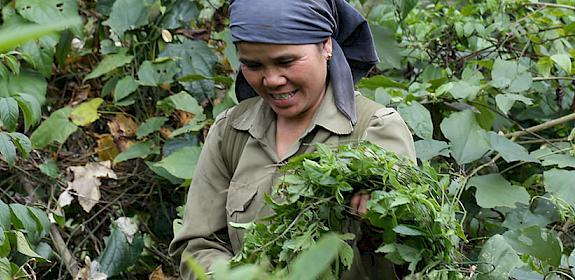New film shows how communities benefit from sustainable plant harvest
Karnataka, India, 25th August 2010—A new video showcases how village forest communities implementing sustainable harvesting of wild medicinal and aromatic plants benefit local livelihoods and help conserve natural resources that would otherwise be at risk of over-exploitation.
The film follows a field project in Karnataka, India, where the recently developed International Standard for the Sustainable Wild Collection of Medicinal and Aromatic Plants (ISSC-MAP) was field tested.
The Foundation for Revitalisation of Local Health Traditions (FRLHT), India, (now renamed IAIM, the Institute for Ayurveda and Integrative Medicine) helped develop the methodology and the management plan for the field sites in the Agumbe Range in Shimoga and the Katgal Range in Honnavara.
The field project drew heavily on traditional knowledge of the local community, and combined this with techniques to ensure sustainability of supplies.
For example, the film depicts how harvesting the resin of Ailanthus triphysa involved removing the bark of the tree, often killing it in the process.
“It was important to find a way to collect the resin in a commercially viable way but not affect the tree,” explains Dr M N B Nair of FRLHT in the video.
Now, thanks to a new technique developed by FRLHT, groves are cut in the bark, a hormone to stimulate resin flow painted on, and the resin collected.
Local communities formed Task Teams to collect various forest products.
“We used to cut whole branches to collect the nuts of the Ramapatri (Myristica malabarica) tree,” says Narasimha, a Task Team member from the Agumbe Range.
“Now we climb the tree and use poles to pull the branches down so the nuts can be removed by hand and the tree branches saved.”
The project in Karnataka was carried out by FRLHT in collaboration with TRAFFIC India as part of a “Saving Plants that Save Lives and Livelihoods” programme supported by the German Federal Ministry for Economic Cooperation and Development (BMZ).
Following two years of field testing of the ISSC-MAP Standard in parts of Africa, Asia, Europe and South America, the final report on the overall outcomes and project implementation experiences will soon be made available.
ISSC-MAP has now been incorporated within the FairWild Standard, and was jointly developed by the Medicinal Plant Specialist Group/Species Survival Commission of the IUCN in collaboration with WWF Germany, TRAFFIC and the German Federal Agency for Nature Conservation (BfN).




